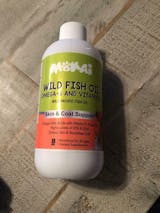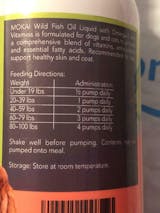Even though minerals, vitamins, and amino acids are great and necessary to boost dogs’ health, for dogs Vitamin E is not just another vitamin.
Vitamin E for dogs is essential for their cell function, immune system, and metabolism. Also, it is good for the heart, liver, muscles, skin, and coat. Besides, it is a great antioxidant that helps protect the cells from damage caused by free radicals, and it is one of your dogs' most important defensive against oxidative damage. This vitamin is essential for dogs’ muscles and circulatory system.
Benefits of Vitamin E for dogs
- Restores skin health thanks to its anti-inflammatory properties
- Bolsters the immune system
- Boosts muscular function
- Enhances cardiovascular health
- Improves vision
Besides, when dogs incorporate Vitamin E from a young age, many age-related issues slow down considerably as they grow up, such as cancer, cataracts, and heart and immune conditions.

Last but not least, vitamin E, a fat-soluble vitamin that can have several forms, can actually block free radicals.
How is that? These cells are produced within the body when the metabolism is working, and that is completely normal. However, when a dog is sick or simply gets old, free radicals can be produced at a greater amount, and that is when cellular damage can occur. Besides, if your dog lives in a city, free radical exposure is much higher, due to air pollution, contamination, and ultraviolet rays. This damage of the cells can cause cancer, arthritis, and heart disease, among other severe conditions.
Vitamin E is good for dogs in order to prevent cellular damage and oxidation. Besides, if taken as a supplement, it provides anti-inflammatory properties and helps dogs' skin and coat.
Where can I find Vitamin E?
Before buying your dog’s food, you need to get acquainted with the label and make sure it contains all the nutrients your dog needs. Vitamin E, together with other essential vitamins and minerals, needs to be included in your dog’s diet. Our Algae oil contains vitamin E oil for dogs, which together with DHA and EPA, provide skin and coat support, bolster your dog’s immune system, reduce joint pain by treating inflammation, and improve brain development.
Deficiencies of Vitamin E for dogs
As a pet parent, you should always make sure your dog is getting enough vitamin E, whether it is from their diet or from supplements. Although they are not very common, deficiencies of vitamin E in dogs can cause severe damage. Muscle weakness or degeneration, eye conditions, impaired immune system, dryness and itchiness, and reproductive problems are some of them. If you think your dog might be experiencing a deficiency of vitamin E, please consult with your vet to determine your next steps.
The AAFCO (Association of American Feed Control Officials) requires dog food to contain at least the minimum amount of vitamin E needed for a balanced diet. The thing is not all dogs have the same needs and dietary requirements.
"Vitamin E for dogs does not only prevent cellular damage, but it also has plenty of benefits regarding skin and coat. It can be incorporated through food, supplementation, or it can be used topically to superficial wounds and to soothe any irritation. Plus, vitamin E oil can be applied to dogs’ noses when they become dry."
Human foods that contain vitamin E:

Apart from vitamin E supplementation which is essential for your dog's wellbeing, your pup can also get some vitamin E from human foods. If you are looking for a nutritional boost and want to feed your dog with healthy treats and snacks, these are the foods that contain Vitamin E.
- Eggs
- Salmon
- Kiwifruit
- Spinach
- Broccoli
- Peanut butter
- Sunflower oil
- Soybean oil
















